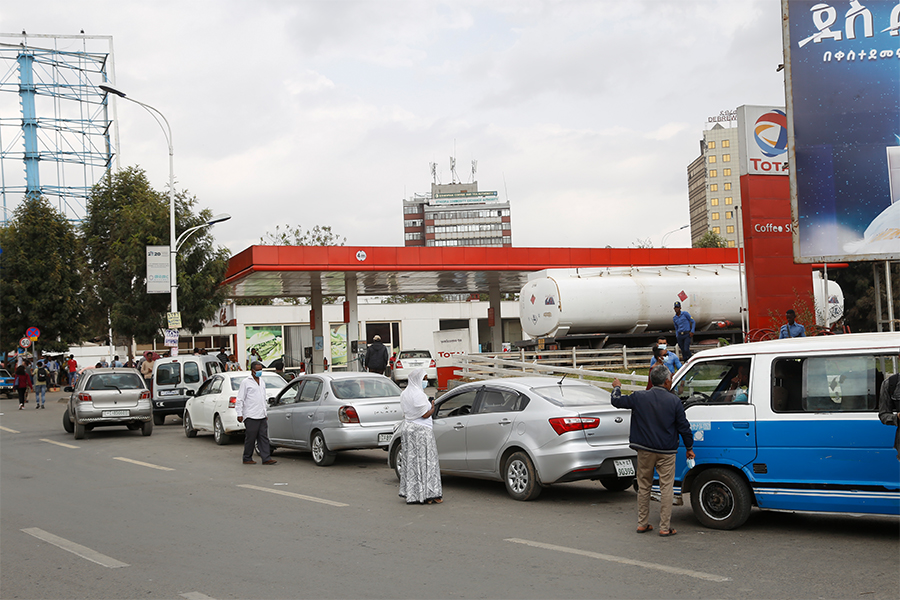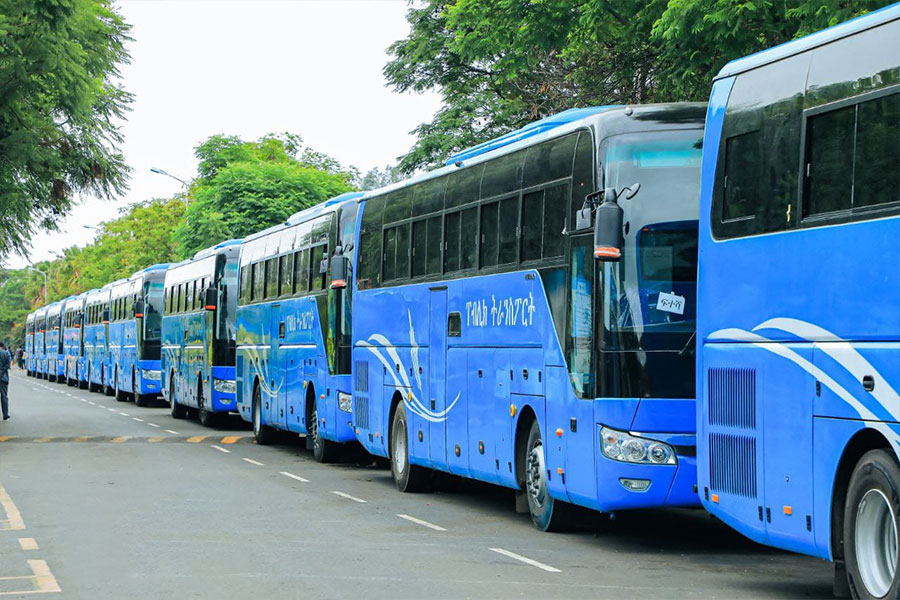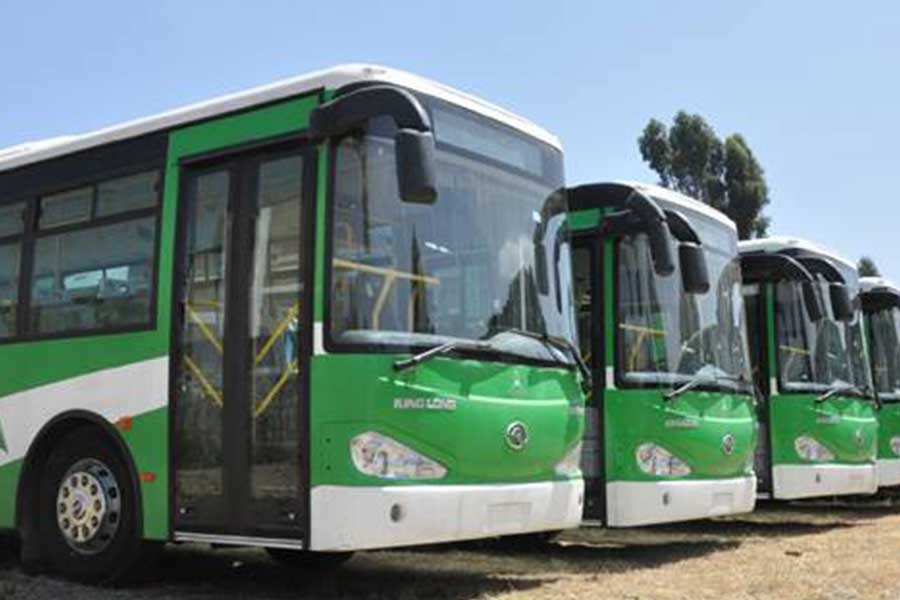
Addis Abeba's taxi terminals are up and going long before most of the city's residents awake from their slumber.
At 6:00am on a drizzly, cold morning last week, a terminal near the Adey Abeba area in Akaki-Qality District was lively, if hectic. Over a hundred commuters had formed a long queue, most clad in thick coats and rubbing their palms together to stay warm. The early bird did not get the worm, as the commuters waited in vain for over an hour to hitch a ride despite showing up at the crack of dawn. Among them was Worku Bertuneh.
“I've been here for close to an hour,” the 38-year-old restaurant manager told Fortune. “This has been my reality for the last few weeks."
It is a routine for Worku to leave his home as early as he can and stay at work later than many of his staff. He tries to avoid the long waits at taxi stops and the traffic jams that clog the capital's roads during rush hour and beyond. It is a strategy that has not paid off in recent weeks to make it to a job that pays a monthly gross of 6,000 Br.
Taxis were arriving at a snail's pace that morning. Emotions and tempers were running high as Worku and other commuters itched to escape the cold. They grew frustrated by the minute; as they waited, a woman donning a long black coat walked to the front of the line. She pleaded with those at the head of the long and winding queue to give her precedence. Everybody, including Worku, angrily told her to bugger off, taking her place at the back of the line.
She tried to envoke empathy. The woman was pregnant. It was no use. The commuters were unwilling to heed her request. Even the taxi coordinators could not persuade them otherwise though they tried.
It is a familiar scene playing out across the capital. Worku shares his woes with 2.7 million Addis Abeba residents who depend on public transport. The recent problem has only added to the capital's notorious transportation deficiencies. A shortage of vehicles and long queues at terminals and stations have become a common sight in the city that prides itself as Africa's political and diplomatic capital.
It has reached new heights over the past couple of weeks due to a crippling shortage of diesel.
Drivers in Addis Abeba were seen rushing to gas stations after the news made its rounds that benzene and diesel would see price increases. Transport authorities have signalled their intention to lift federal subsidies on fuel to all but public transport providers. There was a last-ditch attempt to fill tanks before retail prices jumped. And jump they did.
Last week, retail prices for a litre of benzene climbed by close to 30pc to 47.83 Br. Diesel soared by 40pc to 49.02 Br a litre.
The lead-up to the upward price adjustments, marking the start of the federal government's plan to cut off fuel subsidies throughout the year, was disruptive to commuters and drivers alike. Gas stations saw hundreds of metres long lines snaking through main roads, causing drivers to wait for over seven hours and jamming traffic. Fewer vehicles on the streets characterised the capital in the past couple of weeks, which consumes over half of the daily national consumption of two million litres of benzene and nine million litres of diesel.
The progressive subsidy liftoff was announced at the beginning of the year. However, experts see the inconveniences plaguing commuters like Worku have resulted from poor planning and coordination, as well as ineffective implementation by federal and city authorities. They could have foreseen this and prepared for it, according to Serkalem Gebrekristos (PhD), former CEO of Dallol Oil.
Nonetheless, the authorities blame alleged hoarding and speculation in the lead-up to the price adjustments for the fuel shortages. Last week, officials at the Petroleum & Energy Authority established a task force, dispatching its members across the country to track the whereabouts of fuel trucks. They claim to have found 200 trucks loaded with fuel hidden on the premises of schools and factories.
Industry players beg to differ.
Commuters queue for minibus taxis in Piassa. The lines have grown longer over the past couple of weeks, as less taxis take to the roads in light of a diesel shortage at pumping stations.
Fuel consumption has been increasing steadily, but the government was not responding to the demand, argued Afework Tilahun, a board member of the Ethiopian Petroleum Dealers Association.
Fuel demand has been growing by an average of 14pc annually over the past decade. The state-owned Ethiopian Petroleum Supply Enterprise is the sole importer of petroleum products. It floats international tenders every year, inviting suppliers. Last year, the Abu Dhabi National Oil Company (ADNOC), a state-owned oil company in the United Arab Emirates (UAE), was awarded the contract.
The Enterprise bought 3.7 million tonnes of fuel last year at the cost of 72.6 billion Br (1.36 billion dollars at the current exchange rate). It marks a 154pc increase from import volumes recorded a decade ago. In the first six months of the fiscal year ended last week, 1.9 million tonnes of fuel valued at 62.7 billion Br (1.18 billion dollars) was imported.
Dwindled stocks at fuel depots in Djibouti are partly responsible for the fuel shortage, say people knowledgeable of the industry. The Enterprise operates 13 fuel depots, with an aggregate storage capacity of 371,000 cubic metres. Petroleum terminals at Djibouti's Doraleh Port, including its depots, are under the supervision of Horizon Djibouti Terminals Ltd. There are over a dozen loading bays at the port, with a pumping capacity of 2,000tns an hour. Horizon Djibouti also handles the distribution of fuel from the depots.
On average, two vessels carrying fuel up to 40,000tns arrive at Doraleh Port each month. Between 200 and 300 trucks, each holding between 20,000lts and 43,000lts, transport petroleum products daily from Djibouti to Ethiopia.
But this is part of the story.
Gas station owners buy fuel from the Enterprise using loans from commercial banks with a 16pc lending rate. The Enterprise gradually ceased providing fuel to the stations on credit over the past year. The low-profit margins are among the factors behind the reluctance of stations to buy and distribute more fuel. Station operators have long been pleading with the government to increase their margins. They make less than 0.25 Br a litre. Margins for the various petroleum products are calculated based on investment capital, annual sales, transportation expenses, and administration costs.
Efrem Tesfaye owns a gas station operated by the National Oil Company (NOC) and a fleet of fuel trucks. Over the past couple of weeks, supply disruptions have been a recurring issue at his station in the Asco area. The queues at his station had not grown shorter by the end of the week, even after prices had jumped.
“The fuel supply from oil companies has declined,” he said. "Operating costs are rising fast while revenues are dropping.”
Efrem's station sells up to 1.5 million litres of fuel a month under better circumstances.
Global energy prices are driving inflation in several countries. Crude oil was priced at 112 dollars a barrel late last week. However, the fast depreciation of the Birr against major currencies has exacerbated the problem domestically; profit margins for petroleum retailers have remained unchanged, despite a nod from the Council of Ministers six months ago. Last month, the Petroleum Dealers' Association complained to Gebremeskel Challa, minister of Trade & Regional Integration (MoTRI), pleading with officials to increase the margins. Henok Mekonnen, president of the lobby group, urged the Minister to adjust the margins to 3.5pc of the cost, which would add up to an average of 1.25 Br a litre.
“Unless the profit margin is adjusted, many fuel dealers will be out of business,” Afework warned.
Nonetheless, these are only part of the explanation for the transport crisis in recent weeks. In the face of mounting costs for spare parts and service fees, taxi owners are leaving the transport sector in droves. The series of price adjustments are only added factors fueling this trend. Zebra Taxi Owners Association, one of 13 such organisations registered in the capital, has seen its membership drop by 15pc since it was formed with 400 members three years ago.
“They left, unable to generate enough revenue to cover operational costs,” said Zerihun Desalegn, its president.
One of the taxi owners who left the public transport industry is Bereket Alemayehu, a father of two. Until last month, he operated a blue-and-white minibus taxi, barely hanging on to a trade pushed to the edge by mounting expenses.
"I was barely making enough to support my family," Bereket told Fortune.
He bought a Toyota Hiace 2008 model vehicle a decade ago. Bereket used to earn a daily average of 750 Br. His running costs began to grow out of his control over the past couple of years as prices for spare parts and maintenance ballooned.
“I couldn’t cover the expenses anymore,” he said.
Out of frustration, Bereket sold his vehicle last month for 750,000 Br. It was a loss in real terms, accounting for inflation.
“I had no choice,” he said.
Thousands of public transport service providers face a similar dilemma, left with little choice but to shell out exorbitant sums for parts and maintenance or abandon their trade. Although the prices of spare parts may vary widely depending on the make, model, and year of manufacture, the market has seen blanket increases. Four months ago, a name-brand oil filter cost 500 Br. It has since jumped to 800 Br. The price of brake pads tripled to more than 2,500 Br compared to last year, while prices for a high-quality water pump sold for 6,000 Br, up from 3,500 Br.
Not only prices are on the steady rise, but the parts are also hard to find. Many taxi owners' models are so old that parts are not found in markets. Not even dealers in Somali Terra, an area notorious for trading questionably sourced parts, make these parts available.
Bereket now spends his time at home.
“I've yet to decide what to do next,” he told Fortune.
Transport authorities appear to be not alert to the shift in the transport industry. The Addis Abeba Transport Bureau dispatches nearly 8,000 vehicles daily, a third less than those operating two years ago.
However, Dawit Yeshitla, head of the Bureau, says he is unaware that minibus taxis are walking out.
The taxi drivers still braving the roads face last week's monumental price adjustments. Federal authorities' promises that public transport vehicles would continue to enjoy subsidies for the coming five years weened off at a much slower pace than other drivers have yet to materialise. Taxi owners under Zerihun's Association paid for fuel like any other vehicle owner.
“Our station has not started selling fuel at subsidised prices for public transport vehicles,” said Elias Ali, manager of a fuel station operated by TotalEnergies Ethiopia around the Bulgaria area.
Neither have transport authorities adjusted tariffs yet.
“The tariff will be adjusted within a month,” Dawit disclosed to Fortune.
Federal transport authorities have identified a quarter of a million vehicles providing public transport services that will continue benefitting from fuel subsidies. These vehicles are required to register with local transport bureaus and acquire stickers to identify themselves. Cross-country public transport providers will be tagged with blue stickers, and others will have white.
Although taxi associations are tasked with handling the printing of stickers, most of them have yet to do it. The Addis Abeba Transport Bureau notified the Association about the printing at the end of the week, two days after the fuel subsidy liftoff began, according to Zerihun.
“We ordered the printing of 400 stickers immediately after the notification,” he said. “I hope they'll be ready next week.”
Two months ago, the state-owned Ethio telecom and the Ministry of Transport & Logistics made a deal to see transport vehicles use the former's mobile money platform to pay at gas stations. Transport vehicles will receive a personal identification number (PIN) code that allows them to pay using Telebirr, where data on cars and their owners is stored. Last month, a pilot programme to integrate vehicle owners with Telebirr began in Addis Abeba. Close to 500 transport providers were registered during the piloting period.
Telebirr has been active since last week, according to Mesay Wudneh, communications director at Ethio telecom.
“Close to 3,000 agents have been dispatched to fuel stations to monitor the system and networking," he said.
The Director says close to 900 fuel stations across the country have been registered on the Telebirr system.
“Although workers at fuel station have opened Telebirr accounts, they haven't received PIN codes,” says Elias, the gas station manager.
According to Abdulber Shemsu, deputy director at the Ethiopian Road Fund, less than 130,000 public transport vehicles had received a personal identification number by the end of last week.
Technical experts from the telecom operator visited him last week and promised to return to provide training to the station's employees on how to use the platform to facilitate payments.
The pilot programme was partially successful for Afework of the Petroleum Dealers Association. But he argues there has not been sufficient preparation to accommodate the needs of a quarter-million vehicles.
When the dual price rate system goes live, officials hope to curb illicit trade using GPS tracking devices. They introduced the idea two months ago, announcing that public transport vehicles are compelled to install the devices to continue receiving subsidised fuel. The devices would allow officials to access real-time information on vehicles' locations, routes, and speeds. Although 40 GPS device providers have been selected to carry out the task, most taxi owners have yet to install GPS.
The disarray ploughing the officialdom and the desperation of the operators could only prolong the days when commuters like Worku line up for hours in early cold mornings waiting for the next minibus to arrive.
PUBLISHED ON
Jul 09,2022 [ VOL
23 , NO
1158]


Fortune News | Aug 13,2022

Viewpoints | Apr 30,2022

Fortune News | Oct 30,2021

Sunday with Eden | Oct 12,2019

Radar | Jun 01,2019

Fortune News | Jun 26,2021

Radar | Dec 19,2021

Featured | Nov 13,2021

Radar | May 12,2024

Dec 22 , 2024 . By TIZITA SHEWAFERAW
Charged with transforming colossal state-owned enterprises into modern and competitiv...

Aug 18 , 2024 . By AKSAH ITALO
Although predictable Yonas Zerihun's job in the ride-hailing service is not immune to...

Jul 28 , 2024 . By TIZITA SHEWAFERAW
Unhabitual, perhaps too many, Samuel Gebreyohannes, 38, used to occasionally enjoy a couple of beers at breakfast. However, he recently swit...

Jul 13 , 2024 . By AKSAH ITALO
Investors who rely on tractors, trucks, and field vehicles for commuting, transporting commodities, and f...

Oct 18 , 2025
The political establishment, notably the ruling party and its top brass, has become p...

Oct 11 , 2025
Ladislas Farago, a roving Associated Press (AP) correspondent, arrived in Ethiopia in...

Oct 4 , 2025
Eyob Tekalegn (PhD) had been in the Governor's chair for only weeks when, on Septembe...

Sep 27 , 2025
Four years into an experiment with “shock therapy” in education, the national moo...